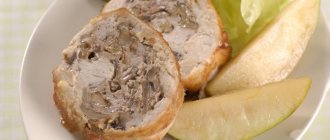“Eat breakfast yourself, share lunch with a friend, give dinner to your enemy.” Proverb
It's funny that the proverb doesn't say anything about what to do with a late-night snack?
Causes of nighttime breakdowns
Why do we find ourselves drawn to the refrigerator when night falls? Midnight eating is a way to eliminate the brain signals that are begging for satiety. In fact, to solve a problem, you need to eliminate the cause. Overeating at night can have several causes:
1. Incorrect diet and illiterate distribution of portions per day - lovers of snacks at night often refuse breakfast, have little lunch at work, “swallowing” mashed potatoes and instant noodles on the go. People allow themselves to relax in the evening. That’s when the stomach has a “holiday”. They use fried potatoes, pickles, chops...
2. Nervous situations and prolonged depression - stress is one of the motivators of the desire to eat at night in order to drown out mental pain. Instead of looking for a source of positivity, many choose the easiest source of pleasure - food at night.
3. Incorrect functioning of the body - eating before bed can be tempting for those who suffer from diabetes or gastritis. When there is an excessive level of sugar or acidity in the stomach, “breakdowns” occur, and the person runs to the refrigerator.
The question “how to stop eating at night” is asked not only by snack lovers, but also by everyone who watches their figure.
How not to overeat
If you notice that you often overeat at dinner, you can use our tips.
- Don't go hungry all day.
- Don't eat because you're bored. Feel hungry.
- Eat regularly by the hour. It is best to have 3 full meals and 2-3 small snacks per day.
- Chew each piece of food thoroughly, do not “throw in” the food too quickly.
- If you feel like you want more, pause. Perhaps the brain has not yet realized that the body has enough.
- Eat in the kitchen, without a book, phone or TV. If the brain is distracted by other processes, it may miss the saturation point, which leads to overeating.
As you can see, overeating is a big problem that comes with unpleasant symptoms and can lead to serious health problems. If you do overeat, you need to move a lot and also stick to a special diet the next day.
| Share: |
Similar materials
Eating at night is harmful!
Most people cannot eat at all in the morning, and easily skip breakfast. But it’s probably impossible to find people who don’t like to dine. Many people like to eat before bed, and attempts to “not eat after six” usually lead to breakdowns and irritability.
From a medical point of view, overeating at night is harmful, as this leads to the active production of insulin, a hormone that promotes fat accumulation. So it turns out that on the one hand, eating at night is bad, but not eating is also not good.
Therefore, it is very important to find a middle ground, that is, not to overeat in the evenings. The following techniques will help you solve this problem, which can be divided into three groups - behavioral, dietary and psychological.
How to protect yourself from night trips to the kitchen?
If you're serious about quitting late-night snacking, these tips will help you keep yourself out of the fridge, or at least away from excess weight.
Look what you eat during the day
First of all, look at what you eat during the day, when and how much. To monitor, you can even keep a food diary or use special applications for this. As a result, you will know how much protein, fat, carbohydrates and sodium your body consumes during the day, and what you can eat late at night so as not to spoil your figure.
Nutrition coach Milham Tara recommends eating a big breakfast, a big lunch, and a small snack before dinner. The journal will also help you understand that you have received all the nutrients, the lack of which may well drag you to the kitchen at 10 pm or at night.
Drink more water
Make sure your body gets enough water throughout the day. Drink 2 liters of water a day, or more if it's hot outside or you're exercising. Dehydration can create the illusion of hunger, which will disappear with a couple of glasses of water.
Hot soothing drinks
Nutritionist Lucy Gabel recommends calming yourself with a cup of hot herbal tea during night hunger. You can also drink hot water with lemon, honey, cayenne pepper, cinnamon and ginger at night (add ingredients to taste).
“Warm water helps you relax, feel calm and satisfied, and honey helps you cope with hunger,” explains Lucy.
Lock the kitchen
This is the last method for those who cannot eat a little, and if they have already reached the refrigerator, they sweep away everything, literally washing down the chocolates with borscht.
Create an unbreakable rule: do not enter the kitchen at all after ten in the evening, for example, or after eight.
Do whatever you want - read, watch TV, go for a walk or take a hot bath. You can just go to bed, but, of course, not immediately after dinner.
If you're tired, your willpower may not be at its best, so you might want to take some rest, such as a nap.
Dietary ways not to eat at night:
1. You can eat... but only low-fat foods
Usually this rule helps everyone, because the formation of fat in the body is influenced by the fat we eat. And if we eat less fat, it means there will be less of it in the body. Feel free to eat low-fat cottage cheese and meat, cereals with water - they are filling and do not affect excess weight.
Low-fat snack for the night
If you eat a slice of lean meat with vegetables an hour or two before bed, nothing bad will happen. Before going to bed, you can prepare a delicious snack from 50 g of cottage cheese, boiled buckwheat, fermented baked milk and a couple of spoons of muesli. Its calorie content is only 130 kcal, and its fat content is 3-4 g.
Proper dinner
Surprisingly, the more abundant and fatty the dinner was, the more you will want to eat within a couple of hours. This means that it is unlikely that you will be able to eat enough at one time, so it is worth changing your tactics and eating small portions several times during the evening.
Before leaving work, eat yogurt or granola. When you get home, you can have a light snack. And in about half an hour - a full dinner. Thanks to this technique, it will be easier for you to control yourself at dinner and choose low-fat foods.
Variety of food
The more components in your dishes, the more varied their flavor combinations, and the slower you eat. That is, you eat less food. Overeating is usually associated with taste monotony. We quickly get used to food and forget about it, which means we don’t notice the amount of food we eat. To diversify the dish, combine several types of vegetables, etc.
Pre-meal
There is a small dietary trick - if 20 minutes before a meal you eat a small piece of fish, lean meat or cottage cheese with bread plus a glass of kefir, then at dinner you will be full much faster and will be able to control yourself. This happens because animal protein in combination with starch always gives maximum satiety with a minimum of calories.
If you don’t want to “eat” extra calories, drink a glass of milk or mineral water 15-20 minutes before dinner in small sips.
Allow yourself treats in reasonable quantities
Sometimes our overeating is associated with our desire to indulge. But treats are not designed to saturate our body; they are created to give us pleasure and lift our spirits. It is always fatty or sweet foods that affect the formation of extra pounds.
To avoid overeating treats, savor each bite slowly to savor the flavor.
Instead of food - herbal tea
Brew yourself some mint tea – its incomparable aroma and refreshing taste will curb your cravings for uncontrollable late-night eating!
Last meal without spices!
Do not add spices and herbs to the dish during the last meal - they exacerbate the feeling of hunger and increase appetite.
Mini dessert
After dinner, treat yourself to a light dessert - a small piece of dark chocolate, low-fat yogurt, fruit. This food will lift your spirits and help you fight your nighttime appetite.
Make your food varied
The more components a dish includes (for example, two pieces of different meat - veal and chicken, two types of side dishes, a spoonful of lecho, canned beans or corn plus vegetables), the slower you eat dinner, because you try one taste, then another, then a third. . Accordingly, you get satiated faster and with less quantity. We often overeat precisely because of the monotony of our diet. After the first spoons, we get used to the taste, forget about food, watch TV, talk and, without realizing it, eat too much.
Article on the topic
How to curb your appetite? 5 ways to trick your stomach
Behavioral techniques of not eating at night
The main task is to organize food and make it less fatty and plentiful.
Walk before bed
Often evening overeating is caused by the desire to calm down, and not to be satiated. After all, as you know, food calms you down. But not only food can calm you down; for example, a walk in the fresh air works just as well.
Make your body happy, not your stomach
Body treatments, such as a bath with aromatic oils, massage and shower, also help to calm down and reduce the need for food. They cause pleasant sensations, which means they reduce the need for “edible” pleasure.
Walk more
Physical activity perfectly improves mood, invigorates and reduces appetite. But the loads should be moderate, for example, healthy walking, which will reduce the need for food and start the processes of fat breakdown.
Go to bed early
The secret is simple - the earlier you go to bed, the less you eat. And adequate sleep makes it easier to control weight.
Inhale the aroma!
Aromatherapy or incense sticks will also save you from evening overeating. Use soothing scents - lavender, mint, chamomile.
Eat treats on your own time
In the evening we often overeat not because we are hungry, but because we want to eat. Treats are special foods. Its task is not to nourish it with energy, proteins and vitamins. It’s about bringing pleasure, joy, elevating your mood, and creating a feeling of comfort with its bright taste and aroma. The need for treats may be greater or less. But rarely does anyone have it at all.
Do not swallow goodies on an empty stomach. Don't turn enjoying them into eating them yourself. Eat small amounts at the end of dinner, having already had your fill of everyday, low-fat and not very sweet foods. Eat slowly, savoring every bite. And then a small amount of treats will be enough for you. Cut the candy into slices, enjoy, slowly, savoring each one, drink tea with them. Also cut the next one and you will eat significantly less candy.
Psychological techniques of not eating at night
A lot here depends on our thoughts and attitude towards food.
“I can do anything”
If a person knows that it is possible to eat at night, he will not overeat, but if he is sure that it is impossible, he will constantly break down.
No time to eat
The modern pace of life often simply does not leave time for food, so why not use it with good intentions. Go to the movies, theaters and exhibitions more often - this will cheer you up and save you from unnecessary calories.
Out of sight
One of the easiest ways to fix your diet and start life with a clean face is to throw out all the junk food that is hiding in the kitchen cabinets, refrigerator and freezer. It’s better to put vegetables and fruits in a visible place, they will make snacking less scary.
I'm the skinniest!
Imagine yourself slim and beautiful, attractive and charming. Would such a girl really eat enough at night?
Stickers for the refrigerator
Place stickers in a visible place that will indicate bad habits. Look at it always when you want to break your decision, let such a written reminder deter you.
Photo on the refrigerator
Glue the photo to the refrigerator. The options can be very different: a very plump woman, the kind you never want to become, or, on the contrary, a girl with ideal parameters, the figure you strive for.
Go to sleep!
No matter how funny it may be, the sooner you go to bed, the better for you! Lack of sleep produces ghrelin, a hormone that causes hunger. Studies have shown that people who sleep less than 7 hours consume 300 more calories.
Maybe it's a disease?
For some people, especially women, nightly raids into the kitchen develop from a bad habit into an eating disorder. Lack of appetite in the morning, heavy meals in the afternoon and waking up at night with a wild, irresistible desire to eat something.
If you have discovered such a dietary lycanthrope in yourself, most likely the reasons lie in psychological problems and an eating disorder. You can consult a doctor, or just think about what went wrong in your life.
Increase the amount of complex (slow) carbohydrates
One of the reasons for feelings of hunger and lack of satiety is an insufficient amount of carbohydrates in food. And since fast (the most delicious) carbohydrates when losing weight are contraindicated in quantities sufficient to fill you up, you can use complex ones. This is, for example, porridge and honey. The body takes longer to digest food and absorb it, which means hunger occurs more slowly. And then the girl (most often it is the girls who seek help) feels that she is full and does not want to go on a “night watch.”











